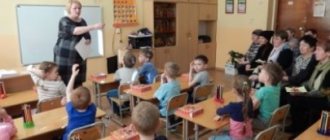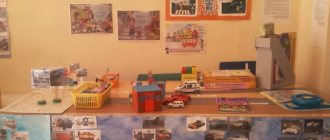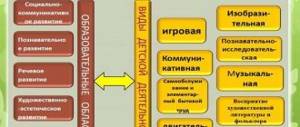Teacher-Mentor Plan
Work plan
mentor with a young specialist
2016/2017 academic year
Target -
development of professional abilities and skills and creation of organizational and methodological conditions for the successful adaptation of a young specialist in a modern school environment.
Tasks:
- providing methodological assistance to a young specialist in increasing the general didactic and methodological level of organizing the educational process;
- creating conditions for the formation of an individual style of creative activity of a young teacher;
- development of the need and motivation for continuous self-education.
| No. | Content |
| September | |
| 1 | Conversation. School traditions. The school's immediate and long-term plans. Specifics of teaching mathematics at school |
| 2 | Study of instructive and methodological letters “On teaching mathematics” in the 2016/2017 academic year |
| 3 | Planning and organization of work on the subject (studying the main topics of programs, drawing up calendar and thematic planning, familiarization with teaching materials, methodological literature, drawing up work programs, lesson planning) |
| 4 | Self-education is the best education. Assistance in choosing a methodological topic for self-education |
| October | |
| 1 | Requirements for a modern lesson. Lesson planning advice |
| 2 | Development of Olympiad tasks. Consultation on preparing students for the Olympiad |
| 3 | Studying the provisions on current and final control of students’ knowledge |
| 4 | Working with school documentation. End-of-quarter reporting training |
| November | |
| 1 | Participation in the work of the RMO. Getting acquainted with the work experience of mathematics teachers in district schools |
| 2 | Consultations on working with documentation (class journals, notebooks and student diaries) |
| 3 | Attending the lessons of a young teacher in order to get acquainted with the work, identify difficulties, and provide methodological assistance |
| 4 | Lesson self-analysis consultations. Discussion of the lesson analysis scheme |
| December | |
| 1 | How to work with student notebooks (studying instructions, tips for checking notebooks) |
| 2 | Practical work on compiling test texts, selecting tasks for independent work |
| 3 | Interview on organizing extracurricular activities in the subject |
| 4 | Discussion of new methodological literature on the subject |
| January | |
| 1 | Methodological developments: requirements for the analysis of the lesson and the teacher’s activities in the lesson. Types, types, forms of lessons |
| 2 | Attending lessons to provide methodological assistance |
| 3 | Consultation on meeting requirements for the volume and nature of homework |
| 4 | Interview on planning and organizing self-education |
| February | |
| 1 | Organization of individual lessons with various categories of students. Individual approach to organizing educational activities |
| 2 | I am learning to build relationships; Analysis of pedagogical situations; General scheme for analyzing the causes of conflict situations |
| 3 | Visit by a young specialist to the lessons of a teacher-mentor |
| 4 | Providing assistance in self-education work |
| March | |
| 1 | Types of control, their rational use at various stages of studying program material |
| 2 | Attending lessons to provide methodological assistance |
| 3 | Professional difficulties. Comfort level of being in a team |
| April | |
| 1 | Forms of knowledge control, how to help students prepare for exams |
| 2 | Attending lessons to provide methodological assistance |
| 3 | Modern educational technologies, their use in the educational process |
| 4 | A difficult situation in class and your way out of it. Analysis of pedagogical situations |
| May | |
| 1 | Exchange of views on the topic “Factors that influence the quality of teaching” |
| 2 | Psychological and pedagogical requirements for testing, recording and assessing students’ knowledge |
| 3 | Analysis of the adaptation process of a young specialist: an individual interview to identify strengths and weaknesses in preparing a young specialist for teaching, identifying aptitudes and personal interests |
Mentor's diary: working with a young teacher
Section 1. Setting goals
The goal of working with a young teacher: to promote the development of his professional potential during the presentation of a master class to the teaching community of the region
Tasks:
— help prepare for the regional forum-competition of professional pedagogical skills “Master class - an active teaching method”;
— take part in determining the idea and theme of the teacher’s master class, corresponding to his temperament and abilities;
— direct the teacher’s attention to the planned results of the master class, the relevance of this type of presentation of teaching experience and building the dramaturgy of the master class;
— carry out correction of the content of the master class;
— motivate teachers to participate in the regional competition “Teacher of the Year 2020.”
Section 2. Coming up with ideas
1. master the technique of reframing in practice;
2. demonstrate different views of people on the same problem;
3. using the reframing technique, take a fresh look at problematic situations both in personal life and in teaching activities;
4. determine the leading method - the exercise method;
5. the teacher himself should learn to respond to “attacks” and negative statements addressed to him using the word “ZATO”;
6. include stories about the Fox and the Hare in the speech (the Fox asks the Hare to write a characteristic for the Donkey. The Hare, without thinking twice, writes: “Dumb and stubborn.” The Fox is indignant: “Well, this is a characteristic for promotion!” Hare: “Oh, well then: stable in his beliefs and persistent in achieving his goals"), about the Hedgehog and the Bear (The Bear blew the Hedgehog, who boasted that he was strong, into the bushes. The Hedgehog crawled out of the bushes, shook himself off and said: “Well, you’ll think that he’s not strong, BUT how light it is, it turns out I can fly too!”) to set the master class participants up for productive activities.
Section 3. Working on the content
Step 1. Before starting work on the master class, the teacher was given the floor from the “I WANT-CAN-NEED” position. We found out that the teacher wants to share his experience in providing an individual approach to students, including children with disabilities, but does not know how to do this.
Step 2. Searching for information on the INTERNET showed that the same master class “roams” from site to site. We turned to the methodological journals of the publishing house MCFER. The reference book of the educational psychologist, School No. 12, December 2020, helped.
Step 3. We studied the article “A workshop that will teach you how to apply the reframing technique in life” and decided to develop a script for the master class “The Magic Words of Reframing.”
Step 4. Developed a script. We came to the conclusion that the ability to transform negative situations into positive ones is necessary for people of any age.
Step 5. Tested the master class on teachers and students of your school.
Step 6. We thought through all sorts of successes and difficulties.
Step 7. The teacher’s moral attitude to win, to be able to enjoy his performance, to become interested in this problem himself and to interest other forum participants in it.
Section 4. We control and direct
To ensure the teacher’s confident performance at the pedagogical forum, 5 rehearsals were held within two hours within their school, each time with different groups of participants. The participants who took part in the rehearsals had the opportunity to watch the work of the Master with subsequent groups, and at the end, expressing wishes and comments.
Performance time was monitored.
Work was carried out on rephrasing words and sentences that did not work with groups of people the first time.
We achieved intonation expressiveness of the Master’s speech.
We removed the psychological fear of performing: we determined the location of the teacher at each stage of the master class, the strength and speed of the voice.
Section 5. Evaluating success
The teacher managed to motivate the participants of the master class to be productive. He was able to interest all those present at the pedagogical forum with the topic of the master class “Magic Words of Reframing”.
It was possible to work with groups of different composition: two, four people, as well as with the entire hall.
At each stage of the master class, reflection (feedback) was built with the participants.
The teacher prepared instructions, handouts, and a presentation for the master class participants.
The Education Department issued an order on the results of the pedagogical forum. The teacher was awarded a certificate on the regional stage and presented with a bouquet of flowers. This was the teacher’s first finest hour, inspiring him for further creative searches.
The master class script was published in the district methodological collection and posted by the teacher in his personal account on the INFOUROC portal.
The teacher received a bonus to his basic salary as an incentive. The district methodological office recommended that the teacher prepare documents for certification for the first category.
Section 6. Opening up new opportunities
The teacher’s professional growth occurred not only in the eyes of the teaching staff and school students, but also in the eyes of the district’s teaching community.
The impact on improving the quality of education is obvious: children become calmer, more confident, and happily take on any task without fear that something will not work out.
The teacher works in an inclusive environment, successfully using reframing as a therapeutic tool.
As a result of working on the master class, the teacher is ready for new achievements and decided to take part in the regional professional competition “Teacher of the Year 2020”.
Report from the teacher-mentor on the work done.
Anna Prokhnovskaya
Report from the teacher-mentor on the work done.
Slide1
The education system is a complex and important aspect in the development of society. Much depends on how we accumulate, systematize and pass on our knowledge to the generations following us. The period of entry of a beginning teacher into the profession is characterized by tension and importance for his personal and professional development. How this period goes depends on whether the newly minted teacher will become a professional, whether he will remain in the field of preschool education or find himself in another field of activity.
Slide 2
The mentor’s task is to help the young teacher adapt to the team, to make sure that he does not become disillusioned with the chosen path. This problem must be solved taking into account the fact that a young specialist goes through several stages in his professional development.
Stage I – 1st year of work : the most difficult period, both for the newcomer and for the colleagues helping him adapt;
Stage II – 2–3 years of work : the process of developing professional skills, gaining experience, finding the best methods and techniques for working with children , forming your own work , gaining authority among children, parents, and colleagues. The teacher studies the work experience of colleagues at his institution and other preschool educational institutions, improves his professional skills by attending open events, methodological associations of educators, etc.
Stage III – 4–5 years of work : a system of work , we have our own developments . The teacher introduces new technologies into his work ;
Stage IV – 6th year of work : improvement, self-development, generalization of one’s work .
Since Lyubov Nikolaevna immediately went on maternity leave after graduating from the pedagogical school, and before that she had already worked as a teacher in tandem with me, she is no longer new to her profession, therefore, having returned to work this year, the teacher is already at the third stage of professional skills. This year is difficult for her and for her mentor in the sense that during the period of her vacation, changes have occurred in the education system, and the teacher needs not only to integrate into her usual work , but also to learn a lot again.
Slide 3
The Federal State Educational Standard for Preschool Education assumes that a specialist must be competent in all areas of development of preschool children, therefore, starting work this year , we have set ourselves the following goals and objectives:
Goal of the work :
Development of professional skills of a young teacher .
Tasks:
1. Providing methodological assistance to a young teacher in increasing the level of organization of the educational process and improving the forms and methods of organizing joint activities of students with the teacher;
2. Creating conditions for the formation of an individual style of creative activity of a young teacher ;
3. Development of the need and motivation for continuous self-education;
4. Providing assistance in introducing new educational technologies and developments work .
Main areas of work :
— study of the regulatory framework;
— maintaining documentation of a preschool institution;
— organization of the educational process in preschool educational institutions;
— forms and methods of organizing joint activities of pupils with the teacher;
— mechanism for using didactic, visual and other materials;
— organization of joint educational activities, tasks and goals;
— the use of new educational technologies and developments , both during educational activities and at any moment;
— general issues of methodology for organizing work with parents ;
— choosing a methodological topic for self-education;
— preparation for certification of suitability for the position held.
Mentor's report on the work done.
The choice of the form of work with the young specialist Kulebakina Lyubov Nikolaevna began with a conversation. I found out that the young teacher is experiencing difficulties in some areas. The reasons for these difficulties, in her opinion, are gaps in work and lack of teaching experience . work, Lyubov Nikolaevna needs to learn to analyze and evaluate her activities and behavior, to see and understand the motives of the child’s behavior. She needs methodological assistance, namely: watching open classes with experienced educators, getting acquainted with advanced pedagogical experience , becoming familiar with new educational technologies and applying them in practice.
We have drawn up a joint individual work plan for the teacher-mentor and the young teacher .
Work was carried out to develop the following skills in the young teacher :
Slide4
•Development of the ability to use the regulatory framework: Federal Law “On Education”
;
Family Code; Federal Law “On Basic Guarantees of the Rights of the Child of the Russian Federation”
; Convention on the Rights of the Child; Sanitary and epidemiological rules and regulations for preschool educational institutions; Federal State Educational Standards for Preschool Education; local acts of preschool educational institutions.
•Development of the ability to maintain documentation of a preschool institution: consultations were held on long-term, calendar and comprehensive thematic planning; assistance was provided in organizing high-quality work with the group’s documentation. During the reporting period, we studied: the educational program of the institution; tasks and goals of the annual plan;
Slide5
•Development of the ability to organize the educational process:
Lyubov Nikolaevna and I regularly discuss issues of organizing the educational process with children. I direct her activities towards the use of health-saving technologies. In her independent work , she is looking for new forms that she uses to organize Health Week.
, sports festivals, motor recreational games. To organize the physical activity of children, Lyubov Nikolaevna supplemented the group’s material with non-traditional sports equipment.
Each child will receive an individual approach. Lyubov Nikolaevna treats children as individuals, and not as an object of influence.
Slide6
To organize joint activities between children and the teacher, I invited Lyubov Nikolaevna to observe the work of the teacher in the morning, evening hours and during walks, not only in her group, but also in groups of other teachers . Together we analyzed the organization of educational work in special situations and noted the positive aspects that it can use in its activities.
I did not ignore this question. And in order to understand how a young teacher , I myself observed work and noted the positive aspects.
Together with Lyubov Nikolaevna, we prepared notes on organized educational activities, talked through each stage and element of the lesson. The most successful OOD options are “Ice Cream Tales”
— drawing based on S. Pisakhov’s fairy tales;
“My glorious city”
- by getting to know the surroundings.
Slide7
I recommend that when preparing for organized educational activities, more actively use preliminary work , game techniques and electronic resources.
She is interested in everything new, she began to master and apply information technologies in the educational process: she developed thematic presentations and interactive visual material.
Slide 8
We came to the conclusion that Lyubov Nikolaevna needs to take part in enriching the group’s developmental environment with didactic material in accordance with the requirements of the Federal State Educational Standard for Educational Education. Lyubov Nikolaevna involves children and parents in the production of didactic material.
Having studied the portfolio of a teacher-mentor , she became interested in using the project method in her work . So we created a project for the moral and patriotic education of children “Education of patriotic feelings of a preschooler through familiarization with their hometown”, which merged different topics: “Family”
,
“Native village”
,
“Professions of parents”
,
“Folk crafts and crafts of the Arkhangelsk region”
,
“Our famous fellow countrymen”
,
“Arkhangelsk land”
. In the process of project activities, children learned about the nature of our region, its resources and enterprises, expanded their knowledge about famous people of the region: M. Lomonosov and S. Pisakhov, enriched their knowledge about the hero cities of our Motherland and the people who defended it. Thanks to project activities, children develop a cognitive interest in the history and present of our city and people.
Slide 9
• Development of the ability to organize work with parents : together with the mentor, parent meetings were held “In a year I will be a first-grader”
, “Nurturing the patriotic feelings of a preschooler through familiarization with his hometown,” a workshop for parents “Preparation for teaching literacy to children of senior preschool age is an important factor in the successful education of children at school,” the
“Let’s Feed the Birds”
. The kindergarten area is now decorated with a feeder made by parents. Several more feeders are posted on Trinity Avenue.
Slide11
•Providing assistance in choosing a topic for self-education: at the beginning of the school year, based on the annual tasks of the preschool educational institution and in order to expand children’s knowledge of local history, we decided on a topic for self-education: “Raising moral and patriotic feelings in children through familiarizing preschoolers with the history and culture of their native the edges". Based on the material studied, Lyubov Nikolaevna, together with children and parents, supplemented the development environment of the group on this topic. The result of this work was : first place in the local history corner competition; participation in the district Relay Race of pedagogical excellence in moral and patriotic education with a speech “Tasks of moral and patriotic education”
;
participation in the city drawing competition for Victory Day “We are proud and remember”
.
Slide12
• Solving the problem of preparing a young teacher for certification for suitability for the position held: using my recommendations, observing the work of teachers , attending open events for teachers in the district and city , organizing work in accordance with the topic of self-education, Lyubov Nikolaevna is preparing to pass certification for suitability for the position held. To do this, she still has to prepare her portfolio and work with documents . She mastered the necessary theoretical knowledge and practical skills in working with children .
Conclusion
The young teacher received assistance :
— in acquiring practical skills necessary for teaching work in the position held;
— in developing the ability to apply theoretical knowledge in practical activities;
— in acquiring experience in mastering a variety of modern technologies for teaching and developing the cognitive activity of preschool children.
Slide13





